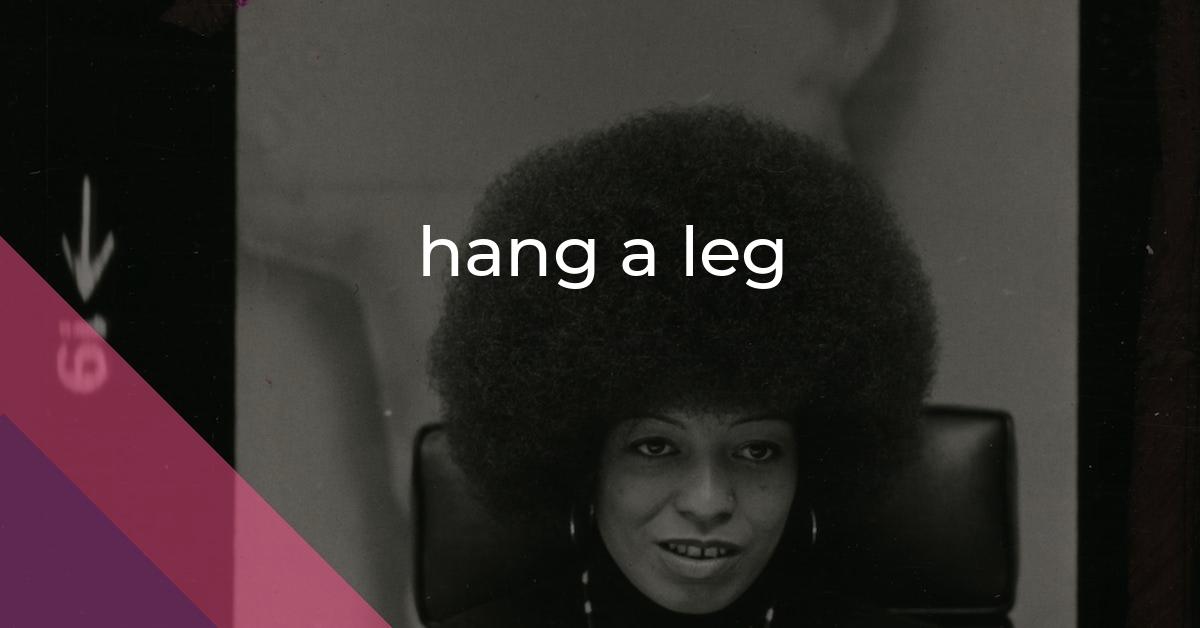hang a leg: Idiom Meaning and Origin
What does ‘hang a leg’ mean?
Hanging a leg is an idiomatic phrase used to describe someone who is procrastinating or taking an unnecessarily long time to complete a task.

Idiom Explorer
The idiom "long finger" means to delay or put off doing something that is supposed to be done or planned.
The idiom "lay by the heels" means to arrest or capture someone, typically in a forceful manner, by seizing their ankles as a form of restraint.
The idiom "kick the can down the road" means to delay or postpone addressing a problem or making a decision, often because it is difficult or unpopular to do so at the present time.
The idiom "kick one's heels" means to wait idly or impatiently for something or someone without any purpose or result.
The idiom "hurry up and wait" means to rush or be quick to do something, only to have to wait for a long time for the desired outcome or result. It reflects the frustrating and often futile nature of constantly being in a state of urgency followed by a period of inactivity.
The idiom "hum and haw" means to hesitate, be indecisive, or be unsure about something. It is often used to describe someone who is taking a long time to make a decision or struggling to give a direct answer.
The idiom "hook it" means to quickly leave or depart from a place or situation. It is often used in a casual or informal context and implies a sense of urgency or haste.
The idiom "hem and haw" means to hesitate or delay in giving a clear or decisive answer.
The idiom "heavy lifting" refers to the difficult or hard work needed to accomplish a task or achieve a goal.
The idiom "have legs" means that something has the potential to be successful or popular over a long period of time.
'Unraveling the Mystery'
Hang a leg has its origins in horse racing. It can mean both literally slowing down or delaying progress, as well as a figurative sense of intentionally dragging one's feet. The phrase emerged in the mid-19th century in the United States, although its exact origin is uncertain. One theory suggests that jockeys would dangle their legs to slow their horses down and create a more exciting race. Others believe it may have originated from the gesture of hanging a fake leg from a horse-drawn carriage to indicate a lack of urgency. Regardless of its specific origins, hang a leg is now used to convey deliberate delay or lack of urgency in various contexts.
Hang a leg is related to the idiom "hang an arse," which has a similar meaning of intentionally slowing down or delaying progress. Both phrases convey a sense of deliberate delay or lack of urgency. While "hang a leg" specifically refers to slowing down or delaying progress, "hang an arse" has a more vulgar connotation. However, both idioms are used to describe intentional slowness in a process or action.
Another related idiom is "drag one's feet," which refers to intentionally delaying or procrastinating. This idiom emphasizes the act of physically dragging one's feet as a metaphor for intentionally slowing down progress. "Drag one's feet" can be used in various contexts to describe someone who is hesitant or unwilling to move forward quickly.
In modern usage, hang a leg is often used to describe intentional delays or lack of urgency. It can be used in personal interactions or professional environments to convey a sense of deliberate slowness. For example, someone might say, "Stop hanging a leg and get moving!" to prompt someone to pick up their pace or complete a task more quickly.
While hang a leg may not be as widely known or used as other idiomatic expressions, it remains a unique and colorful phrase in the English language. Its origins in horse racing and horse-drawn carriages add an interesting historical context to its usage. Whether used in a literal or figurative sense, hang a leg captures the idea of intentional delay or slowing down, adding flavor to our conversations and writing.
So, the next time you find yourself intentionally dragging your feet or being deliberately slow, remember the idiomatic phrase "hang a leg." Whether you're a jockey in a horse race, a driver of a horse-drawn carriage, or simply going about your daily life, this colorful expression can help convey your deliberate lack of urgency. However, be aware that it may not be as well-known as other idioms, so you may need to explain its meaning to some people. Nonetheless, hang a leg is a fascinating phrase that showcases the versatility and richness of the English language.
Example usage
Examples of how the idiom "hang a leg" can be used in a sentence:
- "I had a great time at the party last night, but I really need to hang a leg and get some rest."
- "After a long day of work, I like to hang a leg and watch some TV to relax."
- "I've been studying all day, it's time to hang a leg and take a break."
More "Etymology" idioms



